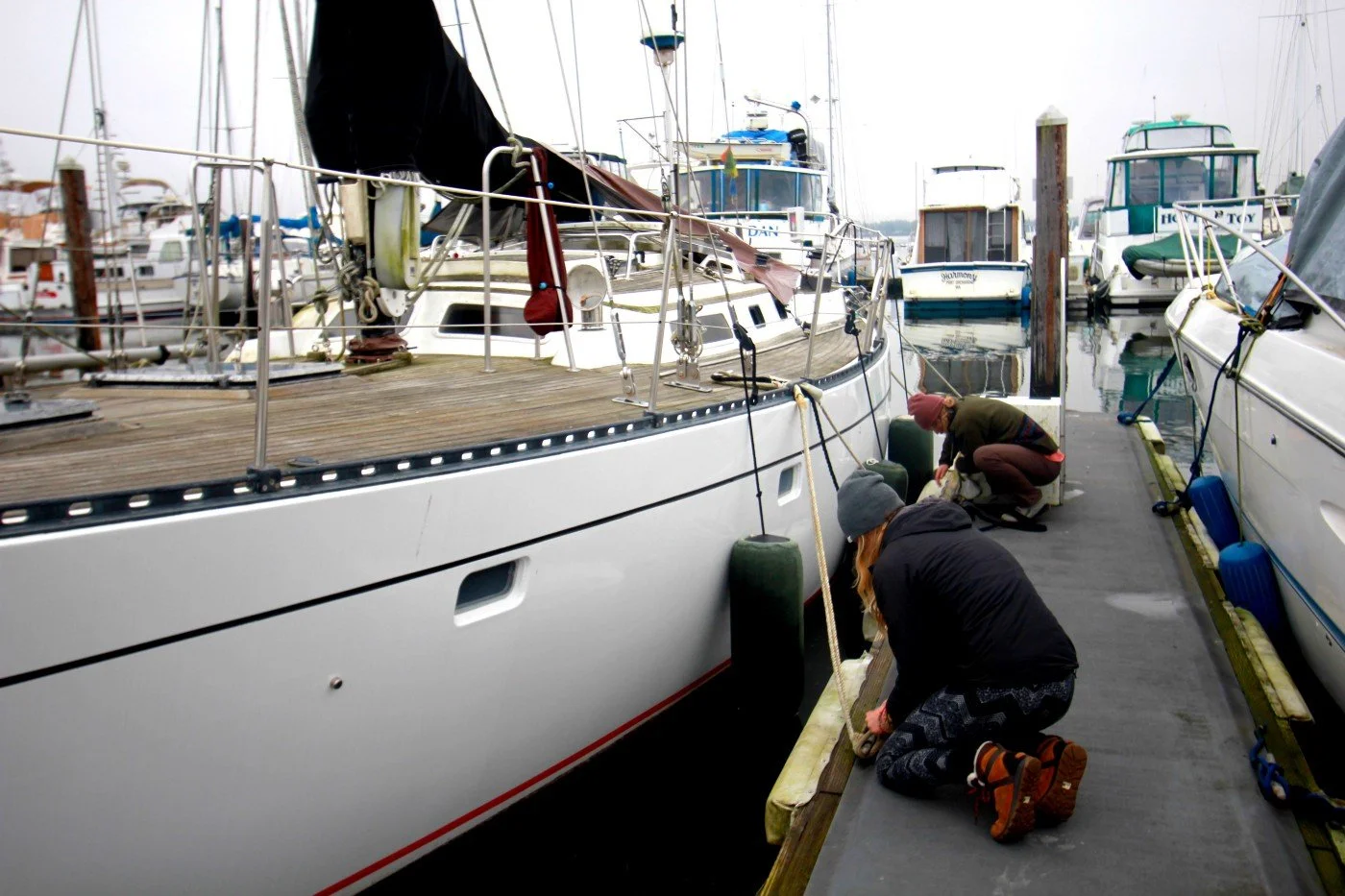Nomadic Insurgence
During the pandemic, many people reevaluated their living spaces and took to the road for more flexibility and freedom.
Photo essay by Cicada London
March 16, 2022
Hidden in plain sight and scattered across towns throughout the country, people are ditching their brick and mortar houses to take up residence in a variety of transportable homes.
Bellingham is no stranger to alternative lifestyles, so it’s not a surprise that some of these individuals, commonly referred to as “nomads,” live and work here.
This nomadic way of life has gained popularity during the pandemic thanks to the shift to remote work. In addition to the freedom of having a home on wheels, some choose to work on the go as they mesh travel and survival all in one. According to a report from MBO Partners, digital nomads in the U.S., or people who can work remotely as they travel, rose 42% between 2020 and 2021, from 11 million to more than 15 million people.
What does this lifestyle look like for nomads in Bellingham?
Meet Forrest Mazarac.
Mazarac lives in his 1993 Ford Econoline 250 that he named “Big Blue.” Early in the pandemic, Mazarac decided to leave his job at a factory and use the money he received from unemployment to pay for a van, which he turned into a home on wheels.
“I knew I was completely capable of handling any of the obstacles that would come my way, and that’s something that I don’t think anybody really talks about when it comes to moving into a van,” Mazarac said.
Obstacles included everything from learning how to build furniture to installing electricity and plumbing.
Mazarac stressed that having a support system was critical when deciding to make this lifestyle change.
“If it weren’t for the friends that I have in my life, this wouldn’t be possible. They give me the opportunity and the resources to become more self-sufficient in this nomadic living experience,” Mazarac said.
Meet Kyle Sholinder and Copper, his mini Australian Shepherd.
Sholinder decided to move into his Subaru Forester with his dog following a string of events that left him feeling uncomfortable in his housing situation. Sholinder is a full-time Western Washington University student and part-time gear expert at the American Alpine Institute.
“Due to my situation, I kind of get all of the crappy parts of living in a car without the good parts,” Sholinder said, because he can’t use his car to travel due to obligations in Bellingham.
At the moment, living in his car makes the most financial sense, even if it is a little cramped.
“If I had an apartment, I would never be there. It would feel pretty crappy to pay for space that I was just going back home to sleep in every night,” Sholinder said. “I think that there are a lot of freedoms that come with living in a car, but I think that I don’t get to take advantage of a lot of those just because of where I’m at right now.”
Sholinder rented a storage unit when he moved into his car because he couldn’t carry everything he owned on a daily basis.
“Get good outdoor clothes,” he said, sharing some advice. “I don’t change a lot. I also don’t smell a lot, and I also don’t do laundry a lot.”
To save space and feel cleaner in the damp Pacific Northwest, he said the best option is to get gear that you can use every day and reuse without having to wash.
When Sholinder is at school, Copper waits in the car. But he is thankful he can take the dog to work with him. Whenever they get the chance, the two love to play frisbee and go on walks on the beach. Sholinder said he found a way to balance his busy schedule, which allows him to spend his free time with his dog.
Meet Savannah Pothier and her husband Larson Wesche.
Pothier and Wesche are experienced nomads who first hit the road in 2018 in their Toyota Dolphin RV. Soon after they decided to build out a Mercedes Sprinter Van together. Following mechanical difficulties, they lived in a pop-up camper for a few months before finally moving into a sailboat in Semiahmoo Bay near Blaine, Washington, which is where they live today.
“You look on Instagram and you see all these people having all this fun with their vans, but how did they afford that? It’s not that simple.” — Larson Wesche
After so much trial and error, Wesche looks back on their experience and mentions how romanticized nomadic living is on social media.
“You look on Instagram and you see all these people having all this fun with their vans, but how did they afford that?” Wesche said. “It’s not that simple.”
Pothier and Wesche started their journey pre-pandemic as a way to travel more and live cheaply, but they soon realized they couldn’t travel as much as they wanted to.
“We never had a lot of money — it seems like we spent all our money [fixing our] stuff,” Wesche said.
Pothier and Wesche pay $500 every month for a moorage slip at the marina they live at. Over time, those payments will add up until they own the slip.
“We wanted to stop renting,” Pothier said. “Renting goes towards nothing. You’re just paying the rental companies and you get nothing out of that situation besides a temporary place to stay.”
Living on a boat comes with its own set of struggles, including the added responsibility of managing weather and tides and maintaining the vessel.
When asked to compare the two lifestyles, Pothier and Wesche both agreed.
“Boat life is way better than van life for every day if you’re stuck in one place,” Pothier said.
“Nobody’s trying to steal your stuff all the time like in Bellingham,” Wesche added.
They recalled incidents when people would bang on their windows at night as they slept in their vehicles, and how that often forced them to move around in search of safer places to park.
“Ever since I started road tripping, the laws and regulation has gotten much more stringent because it’s getting so popular,” Wesche said.
A common message from the nomads is that each lifestyle comes with its own pros and cons despite its rising popularity. Social media does a good job of romanticizing the lifestyle and providing a platform for members to share their experiences, but it doesn’t express the intimate details of what daily life looks like.
For those considering making a shift to a nomadic way of life, “Be prepared to be uncomfortable. It’s not a comfortable experience,” Mazarac said. “The beauty of it though is that I can go anywhere and that’s where my bed is.”
Cicada London is a fourth-year student at Western who is studying environmental education and gaining experience with outdoor photography.







